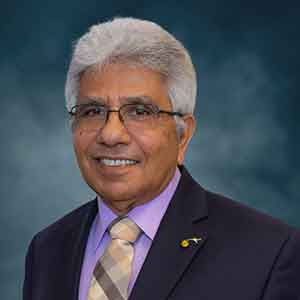Dr. Dipak K. Banerjee
Contact Info
Education
- Ph.D. University of Calcutta, India, 1976
- M.Sc. In Biochemistry, 1968
- B.Sc. In Chemistry, 1962
AAAS Fellow. M.Sc. and Ph.D. degrees from the University of Calcutta, India. Postdoctoral training at the Department of Biological Chemistry, University of Maryland Medical School, Baltimore, MD and the Laboratory of Cell Biology, NIDDKD, National Institutes of Health, Bethesda, MD. Visiting Professor/Scientist at the Center for Cancer, MIT, Cambridge, MA; Center for Hygiene and Medical Microbiology, Phillips University, Marburg, Germany; Physical Biosciences Division, E.O. Lawrence Berkeley national Laboratory, Berkeley, CA. Present and Past members of the Editorial Board: Glycoconjugate Journal, Molecular & Cellular Biology Reports, Puerto Health Sciences Journal. Recipient of Inventor’s Award from the US Department of Commerce, Hind Rattan Award, and Mahatma Gandhi Pravasi Samman (Global Achiever Award) form the NRI Society. Member of ASBMB, ASCB, Biochemical Society (UK), AACR, Sigma Xi, and the Society for Glycobiology. Publications in peer-review journals. Presentations in scientific conferences as invited speaker/keynote speaker, etc. Recipient of Patents from the United States Patents and Trademark Office. Organized National and International Scientific Meetings. Trains students, postdoctoral fellows, and other professionals.
Research Interests
- Regulatory Glycoscience and Glycobiology
- Angiogenesis and Breast Cancer Progression and Metastasis
- Regulation of protein N-glycosylation and protein structure-function relationship
- Congenital Disorders of Glycosylation
- Membrane Transport and Catecholamine Homeostasis
Selected Publications
- Banerjee D.K. (2021) Interactome Facilitates Activation of Glycome Code for Asparagine-Linked Protein Glycosylation. In:Glycome: The Hidden Code in Biology (Ed. Dipak K. Banerjee), pp. 1-20. Nova Science Publishers, Inc., New York (In Press).
- Serrano-Negrón J.E., Zhang Z., Rivera-Ruiz A.P., Banerjee A., Romero-Nutz E.C., Sánchez-Torres N., Baksi K. and Banerjee D.K. (2018) Tunicamycin-induced ER stress in breast cancer cells neither expresses GRP78 on the surface nor secretes it into the media. Glycobiology 28, 61-68
- Zhang Z., Serrano-Negrón J.E. Martínez, J.A., Baksi, K. and Banerjee, D.K. (2018)Dynamic Function of DPMS Is Essential for Angiogenesis and Cancer Progression. Adv Exp Med Biol 1112, 223-244.
- Banerjee A., Johnson K.T., Banerjee I.A. and Banerjee D.K. (2013)Nanoformulation enhances anti-angiogenic efficacy of tunicamycin. Transl Cancer Res 2, 240-255.
- Banerjee A., Lang J.Y., Hung M.C., Sengupta K., Banerjee S.K., Baksi K. and Banerjee D.K. (2011) Unfolded protein response is required in nu/nu mice microvasculature for treating breast tumor with tunicamycin. J Biol Chem 286, 29127-29138.
Book editing:
GLYCOME: THE HIDDEN CODE IN BIOLOGY (2021); Editor: Dipak K. Banerjee; ISBN: 978-1-53619-377-0; Nova Science Publishers, Inc. New York.

